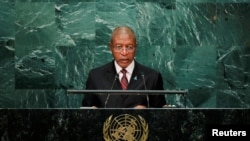Lesotho's Prime Minister Pakalitha Mosisili, is likely to lose a confidence vote in parliament this week and stands ready to call a snap election, according to a senior advisor, as the South African kingdom's economy slows and security deteriorates.
A slew of defections by ruling-coalition lawmakers to the opposition has badly weakened support for Mosisili in parliament two years after he came to power after an inconclusive vote.
"The prime minister is not going to prevail against this motion because his party has suffered the defection of about half of its MPs to the opposition," Mosisili's political adviser Fako Likoti said by telephone. "He is ready to call for elections tomorrow, and is confident he can win because he has grassroots support."
Lesotho's economy relies heavily on textile revenues, regional customs receipts and water piped to South Africa, making it out strategic importance to Pretoria, which has acted as a mediator during previous bouts of political turmoil.
A debate on the motion of no confidence started on Wednesday and will be followed by a vote in the 120-member assembly later in the week.
Two years ago, Mosisili's Democratic Congress (DC) ousted former prime minister Thomas Thabane's All Basotho Congress (ABC) by uniting with smaller parties. Now it is Thabane's ABC that will lead a coalition of opposition parties including the Alliance of Democrats (AD) party in an effort to remove Mosisili.
In a document announcing their union, the ABC, AD and other parties declared to "rescue Lesotho from the current downward spiral into lawlessness, conflict, political instability, economic stagnation and degradation of democracy" once in power.
Lesotho's law says elections must be held within three months of parliament being dissolved.
The small landlocked country of 2 million people, which has been hit by several coups since independence from Britain in 1966, appears set for a period of political instability, analysts say. It's last two elections have not produced a winner with a clear majority.
"The motion against the prime minister is highly likely to succeed, and his chances of winning the election are up in the air as he would be injured politically," said Holo Nyane, a political sciences lecturer at the National University of Lesotho.





